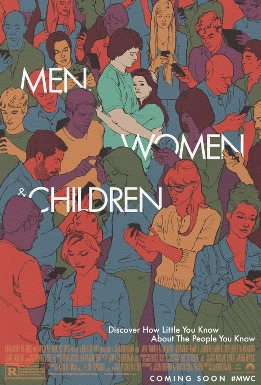Do you feel like every third article across your Twitter feed is about the ramifications of technology on today's youngsters? Are you ready to watch a sprawling, mumbling film about it?
If so, welcome to Men, Women & Children. MW&C is about a group of high school teenagers and their parents dealing with normal problems in a social media-obsessed world. Each teenager and parent seems to tackle a different view of the Internet. Patricia (Jennifer Garner) is the hyper-protective mother who demands her daughter Brandy's (Kaitlyn Dever) social media usernames and passwords so she can read through her chats and text messages. Kent (Dean Norris) is dealing with the aftermath of his wife leaving him and his son Tim (Ansel Elgort), the star football player who has dropped football and picked up playing a World of Warcraft-esque game for hours on end. And then there's husband and wife Don (Adam Sandler) and Donna (Rosemarie DeWitt), who are struggling to find happiness in their marriage while their son Chris (Travis Tope) tries to find intimacy without the crutch of a porn website.
The cast of the film, particularly Elgort, does a great job. The teenagers are at turns vain and self-obsessed, mumbling to parents and treating every text or lack of text as a dire situation. Besides the caricature-like Patricia, most of the parents act like typical teenage parents"”concerned for their children if not a little blind to their problems. Sandler, Norris, and Judy Greer in particular have strong performances. The addition of a voiceover from Emma Thompson gives the film almost a documentary feel, like you're watching an Animal Planet special.
MW&C feels like it's really trying to say something broad about the effects of the Internet, but it tackles so many stories and characters that it ends up saying not much at all. In trying to portray so many stories and groups as fleshed out and meaningful, none of them have any real emotional effect. The heart of the film is most certainly Brandy and Tim, who connect at high school and comfort each other as they each deal with problems at home. Perhaps it isn't coincidental that they're the ones that disconnect most often. While they bond over sending messages on Tumblr, they also sneak away to picturesque locations at night to talk to and hold each other.
Everyone else, on the other hand, is incredibly disconnected from one another, a point that Reitman drives home to excess. Both in the high school hallways and at the mall, text messages and apps appear above the heads of those walking around; whether alone or in a group everyone is staring down at their screens. I suppose it's supposed to be a chilling image, but the glut of such imagery as a scare tactic makes it feel like a silly, over-serious cliché.
While I suspect Reitman threw all this technology in our face to throw us off, I found it refreshing. Most films ignore the omnipresence of technology outside of text messages and references. Perhaps it's because I belong to a younger generation, but the use of technology came across as a glimpse of reality. In movies, couples have meetcutes in a library or a video store and go on adventures without even picking up their phones. In reality, people often meet through online dating sites or even Twitter, and social media etiquette has an effect on our social lives, whether we notice it or not. Adventures are still taken, but you can bet they're well documented on Instagram.
Reitman seems to judge that as the corrosion of human relationships, but I would argue that the jury is surely still out, or at least not as dire as Men, Women & Children make it out to seem.

